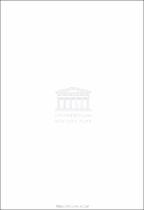Aid to Lesotho: dilemmas of state survival and development
Abstract
This thesis discusses the triangular relationship of aid, state and development since Lesotho's independence. It builds on three key hypotheses. First, during the preadj ustment period aid entrenched bureaucratic state power, but this changed with the adoption of the adjustment programme which only facilitates state survival. Secondly, hemmed in by external developemts and internal political and economic crisis, the state is caught between survival and shrinking resources. Thirdly, given the above, development has remained elusive inspite of the infusion of aid at highly preferential terms. Since the Cold War, aid issues have undergone three phases.
Until the 1960s, donor concerns focussed primarily on economic growth. Growth with redistribution or the basic needs approach
dominated aid disbursement up to the late 1970s. Since the 1980s, aid has been influenced predominantly by the IMF/World Bank
orthodoxy of adjustment. Much of the debate on aid to Africa generally and to Lesotho specifically has revolved around whether
aid develops or underdevelops recipient countries. The view that aid bolsters state power is not new. This study argues, however, that this may not be the case under adjustment conditions. Aid facilitates state survival in the context whereby donors mount a systematic offensive agianst dirigisme and economic nationalism. As they do that, the locus of economic production and interaction is shifted to private agents and autonomous social movements and the role of the state is cut back. Donor confidence, therefore; shifts from states to markets.
The implications of these processes for the Lesotho state and prospects for development form the central thrust of this study. Non-probability purposive sampling was used for data collection. This approach rests on qualitative research methodology. Respondents were chosen on the basis of their position and influence on decion-making processes that impinge on the interface amongst aid, state and development. Primary data sources are clustered into three categories: Government; Donor agencies and embassies; and Non-governmental Organisations.

